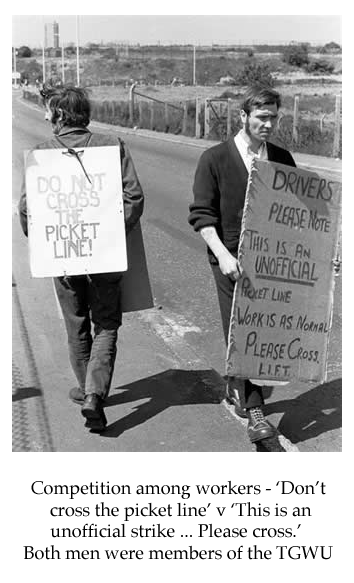Back to Labour Values index
Back to 1970s index
The Dockers' Strike 1972

The Dockers' strike occurred in the context of the Conservative Government's attempts to regulate Trade Union activity with their 'Industrial Relations Act'. A similar attempt by Labour had already been defeated by union opposition. The strike illustrated the dangers of rivalry between different groups of workers - the dockers were fighting to preserve the monopoly of a traditional way of working against the new methods of the container ports. The strike also illustrated the willingness of the working class to defy 'the rule of law', to act as a united class across different industries, when trade unionists were threatened with imprisonment. And it illustrated the willingness of the ruling class to bend the supposed inflexible principle of the rule of law when faced with determined opposition.
Storm in a Labour Teacup May 1972. Some general remarks about the Labour Party - its double function as representative of working class sectional interests and party of national government.
Acting out the Act June 1972. The Industrial Relations Act. Reasons for its enactment and two judgements of the National Industrial Relations Court - the railway pay dispute and the docks/container dispute.
The Act in the Dock July 1972. Why the ruling class was likely to back down. Why it was in its interests to back down. With a more detailed account of the point at issue in the dock strike.
The Unofficial General Strike August 1972. Working class reaction to the arrest of five dockers who defied the Industrial Relations Act. Magnificent display of solidarity but the problems remain unsolved. Inadequacy of mainstream left wing analyses.
The End of the Dock Strike September 1972. A defence of the final settlement against left wing criticism. The [Jack] Jones-[Lord] Aldington Commission v Socialist Worker.